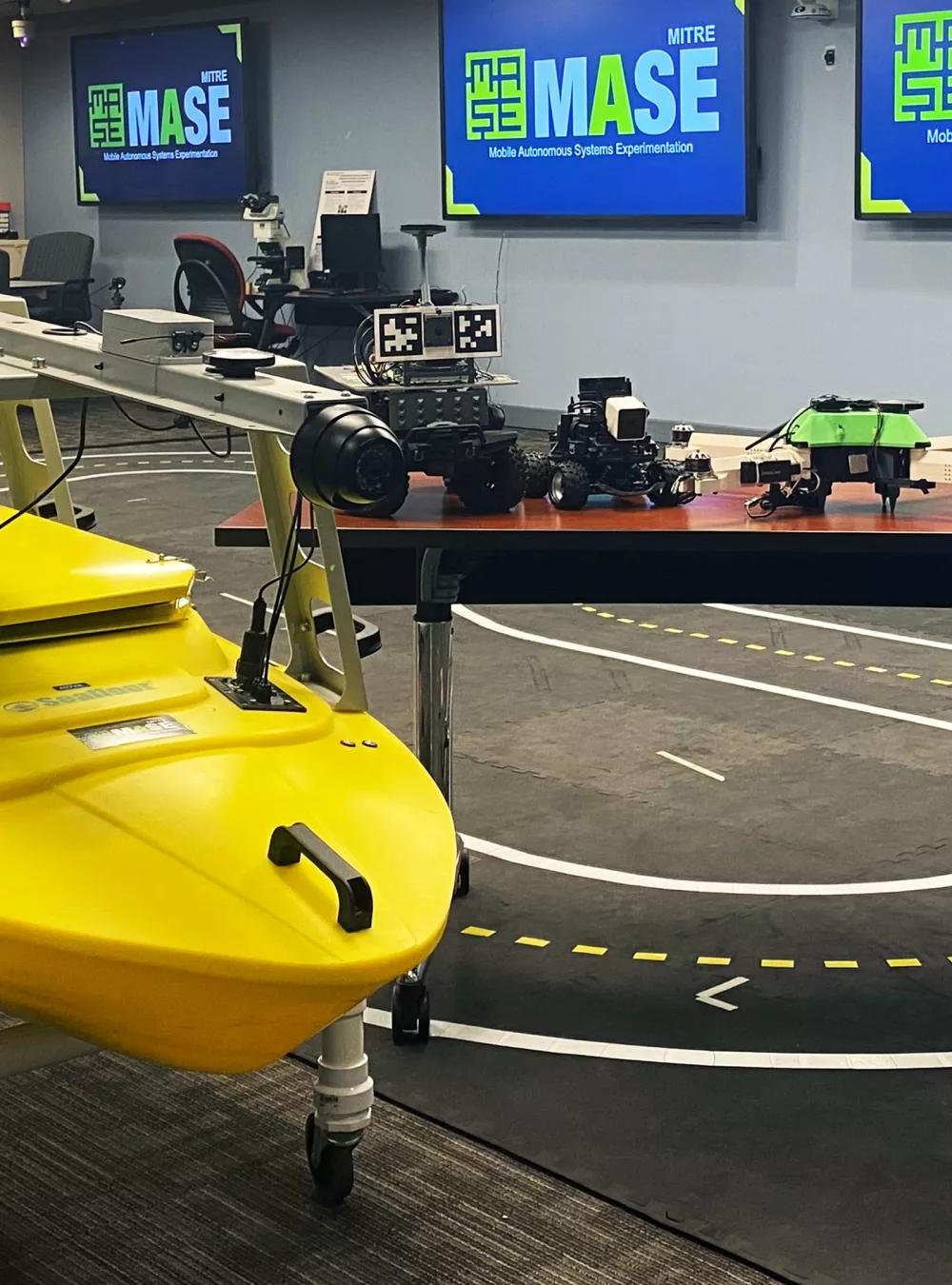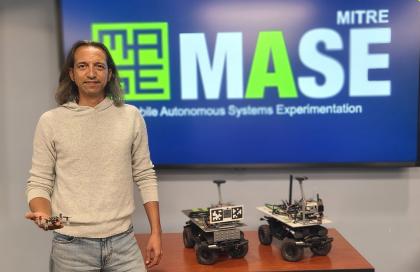Testing autonomy can be a challenge in any environment, but transitioning from computer models to physical robots is particularly tricky. Inside MITRE’s Small Robotics Lab, systems can be developed, tested, and even fail, without catastrophic risk to people, programs, or budgets.

Inside MITRE’s Small Robotics Lab, Failure IS an Option
In MITRE’s Small Robotics Lab (SRL) big innovations come in small packages.

Virtual reality headsets and remote-control vehicles cover desktops. A yellow boat, covered in sensors, sits in the corner. A robotic dog named Spot "sleeps" plugged into the wall, battery-charging light blinking. Quadcopter drones the size of hubcaps loom over microdrones that can fit in your pocket.
While the scale of the experiments here is compact, they are key to a big idea. "When we started the Small Robotics Lab, we wanted to create a space where researchers could access physical platforms that allow them to transition their work out of simulation and into the real world, without the financial or physical risks that come from full-size systems," says Shereef Sayed, the lab manager and lead autonomous systems engineer. It's also a space to cultivate the skilled staff, ideas, and guidance MITRE's sponsors need.
A Place for Big Swings, Without Big Risks
The facility, based at MITRE's McLean, Virginia, campus, is part of the Mobile Autonomous Systems Experimentation (MASE) Lab. There, researchers can design, test, and evaluate robotic platforms and programming. The lab's digital infrastructure includes edge-computing capabilities, which allow small drones to access, in near-real-time, the computing power of larger servers, and precision indoor localization that can mimic GPS.
"We want to lower the barrier to entry for experimentation," Sayed says. "We want users to feel empowered to try new things and push the envelope here, without breaking the bank." The SRL is designed to be a space where researchers and sponsors can take chances and sometimes fail. Innovation requires risk, but inside the lab, a wayward drone can be stopped with a small net that hangs from the ceiling, and a runaway autonomous vehicle might result in no more than a bruised shin.
"If you look at the great work coming out of the places really pushing the envelope with autonomy and robotics, what they're not showing you is that they're doing exactly this," Sayed says. "It's not like they just push the code out onto full-sized platforms or vehicles. There's this intermediate step that looks a lot like the Small Robotics Lab. And where there isn't, there should be."
If you look at the great work coming out of the places really pushing the envelope with autonomy and robotics, they’re doing exactly this
Exploring New Areas for Autonomy
The lab powers innovation in areas of public interest where companies don’t typically operate, like AI assurance and interaction with first responders. Work in the lab and the broader MASE Lab facilities also allows the team to help sponsors tackle challenges that go beyond what typical autonomous systems are currently doing—challenges like healthcare robotics, maritime operations, multi-robot teaming, and more.
Most autonomous systems operate in highly structured environments, with clear rules and signals guiding behavior. However, some of our sponsors work in unstructured environments where managing autonomy can be vastly different.
"It's a very different task to have an autonomous vehicle navigate a well-mapped street in San Francisco than it is to run down a dirt road on the border," says Bradley Canaday, an autonomous systems lead in the lab. "A lot of the ideas and systems in self-driving vehicles we see currently won't directly transfer to a sponsor space."
Inside the Small Robotics Lab, MITRE staff and sponsors can put those ideas, systems, simulations, and code to the test.
And if they fail?
Well, that's what the lab was designed for.
Join our community of innovators, learners, knowledge-sharers, and risk takers. View our Job Openings and Student Programs. Subscribe to our MITRE 360 Newsletter.